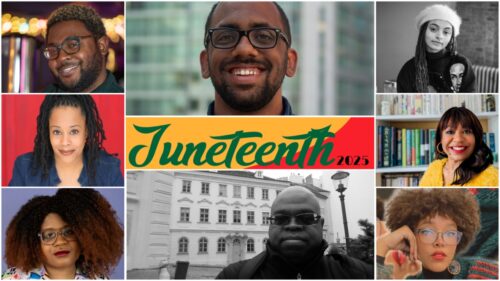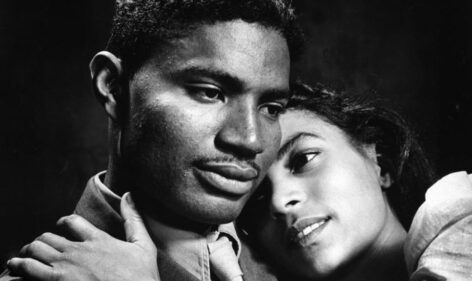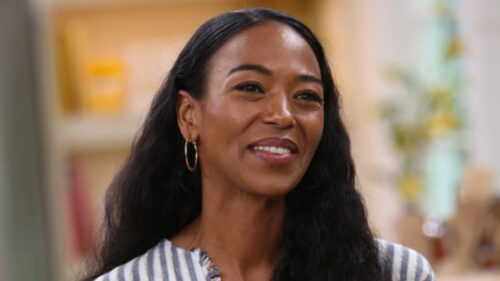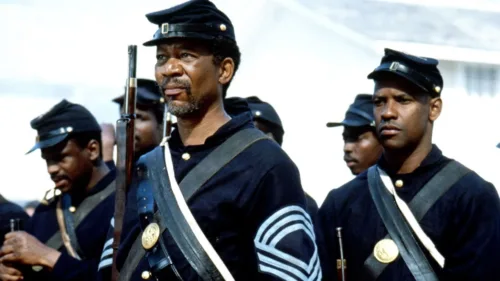The American Black Film Festival (ABFF) has returned to Miami Beach for its 26th year, running from June 15 to June 30. The festival had been virtual for the past two years amid the coronavirus (COVID-19) pandemic. Now, diverse filmmakers, creatives, journalists, and movie-lovers have come together once again to celebrate Black stories and storytellers.
For its 25th year, HBO is presenting its Short Film Award. Regarded as one of the world’s most prestigious short film showcases, The Short Film Award has helped launch the careers of directors like Ryan Coogler and Stefon Bristol. This year, five finalists—Sherif Alabede, Elisee Junior St Preu, Gia-Rayne Harris, Destiny Macon, and Rebecca Usoro—are competing for the award and a cash prize of $10,000.
On location at ABFF, RogerEbert.com spoke with the filmmakers about their films and their creative processes.

Sherif Alabede’s film, “Another Country,” starring Taylour Paige, is based on Pulitzer Prize-winner Natasha Trethewey’s Native Guard. The poetic but haunting narrative is semi-biographical and tells the story of an interracial couple raising their mixed-race child in rural Mississippi amid Jim Crow.
“In visualizing ‘Another Country,’ we didn’t even look at films for references,” Alabede explained. “We looked at photography, particularly Roy DeCarava. He had a series of still photography from the ’50s. Gordon Parks was another good reference when we switched to color in the film. We looked at his series on segregation in the 1950s, which helped us with the aesthetic. We were chasing a certain tone and atmosphere, trying to weave together a poem written almost like a fantasy. It had to have this dreamy equality to it. It had to have this lyricism, too. So I found more inspiration in still photography.”
Elisee Junior St Preux’s Southern Delta set-film, “Aurinko in Adagio,” tells the story of a child musical prodigy, constantly pushed by his overbearing father. However, just as the young boy is set to audition for a prestigious conservatory, he taps into a new gift that involves ancestral dreaming.
Though the film has very little dialogue, relative newcomer Taj Johnson’s haunting expressions carry the film forward. “[Taj] is from Alabama,” St Preux explained. “We auditioned a few boys, and every young boy brought something different. But something interesting about him is he’s 12, and he’s still curious like a two-year-old but has the maturity of a 16-year-old. He’d come and bring pictures and fun facts about jazz musicians to rehearsals. So I found myself learning a lot from him throughout the process. He knew exactly what story we were trying to tell. We did a lot of workshops and chemistry reads and got to know each other. We did one rehearsal; I don’t do much rehearsing. So once we got to set, we did a lot of improv and just had fun. It was a really good time.”
With “Pens & Pencils,” director Gia-Rayne Harris and writer/producer Gem Little were intent on telling a story about the school-to-prison pipeline and why education hasn’t been an equalizer in America. In the film, a young Black teacher, Mallory (Dorée Seay), finds herself desperately searching for a student that no one else seems to miss.
For Harris, the audience needed never to look away. “I think that’s important that an audience gets to feel the very thing that we feel naturally as people of color when we see these things on the news. I wanted to shake people to their core,” she said. “It’s tough because there’s a balance. You don’t want to do something that hurts the people you’re making it for. But, I think it’s essential that everybody understands a minority’s mindset because I know when I see things like that in the news, it’s stuck in me. There’s a system of continued trauma.”
Little had to fight to keep some of the more horrifying images displayed in the film. “The bruised and battered face of a Black man, we wrote it just like that,” she said. “It made many people, especially our executive producers, very uncomfortable. So for us, it was about making sure we stayed true to the things we wanted to say and stayed true to the genre.”

Based on some of her experiences in the engineering field, Destiny Macon’s comedy “Talk Black” centers on a timid engineer who develops a split personality to deal with microaggressions and hostility at work. For Macon, casting two different actresses for the role was imperative. “I’m planning on doing a feature, and people have suggested I use the same actress in the future,” the filmmaker said. “For me, it was like the main character is getting to know her alter ego, so there’s another person inside her who she doesn’t know. I thought there would be less of a jarring situation if it was the same actress. But if it’s a completely different person, it’s more of a journey for her to get to know that aspect of herself.”
In “The Family Meeting,” director Rebecca Usoro showcases a grandmother and a granddaughter coming together to buck traditions in a traditional Nigerian-American family. It was important for Usoro to infuse as much comedy in her film as possible. “Kudos to my mom and dad; I think they’re natural characters,” she laughed. “So much of the writing was just gleaning them. The circumstance is already pretty comedic, given that it’s Christmas, and we’re going through an agenda. What I really wanted to focus on was creating a family that you resonate with, that’s really relatable, that’s really fun.”











